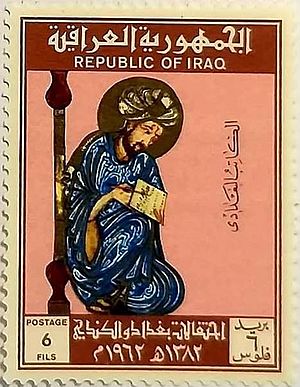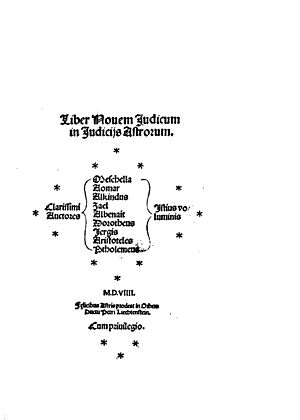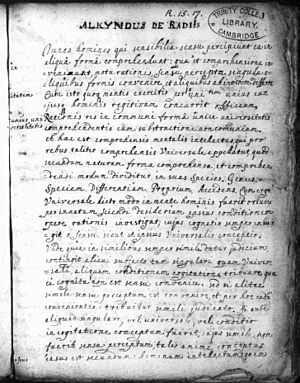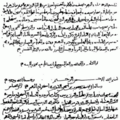- This page was last modified on 17 October 2025, at 10:18. Suggest an edit.
al-Kindi facts for kids
|
al-Kindi
|
|
|---|---|

al-Kindi on Iraqi stamp from 1962
|
|
| Born | c. 801 |
| Died | c. 873 (aged approximately 72) Baghdad, Abbasid Caliphate (now in Iraq)
|
| Era | Islamic Golden Age |
| Region | Islamic philosophy |
| School | |
|
Main interests
|
Philosophy, Islamic theology, logic, ethics, mathematics, physics, chemistry, psychology, pharmacology, medicine, metaphysics, cosmology, astrology, music theory, Islamic theology (kalam) |
|
Influences
|
|
|
Influenced
|
|
Abū Yūsuf Yaʻqūb ibn ʼIsḥāq aṣ-Ṣabbāḥ al-Kindī (around 801–873 AD) was a brilliant Arab Muslim scholar. He was known as a polymath, meaning he was an expert in many different subjects. People called him the "father of Arab philosophy".
Al-Kindi was born in Kufa and studied in Baghdad. He worked at the House of Wisdom, a famous center for learning. There, he helped translate important Greek science and philosophy books into Arabic. This work helped him combine Greek ideas with the Muslim world's knowledge. He wrote hundreds of his own books on many topics. These included metaphysics (the study of reality), ethics (moral principles), logic, psychology, medicine, pharmacology, mathematics, astronomy, astrology, and optics. He also wrote about practical things like perfumes, jewels, and even earthquakes.
In mathematics, al-Kindi helped bring Indian numerals (which we now call Arabic numerals) to the Islamic world. These numbers later spread around the globe. He was also a founder of cryptography, the science of secret codes. He wrote a book called Manuscript on Deciphering Cryptographic Messages. In this book, he introduced frequency analysis, a way to break codes by looking at how often letters appear. This was a very early use of statistical inference. He even used math to help doctors figure out how well medicines worked.
A main idea in al-Kindi's philosophy was that science and Islamic teachings could work together. Many of his writings explored topics important to both, like the nature of God, the soul, and prophetic knowledge.
Early Life and Learning
Al-Kindi was born in Kufa into an important family. His family was part of the Kinda tribe. His father was the governor of Basrah, where al-Kindi got his first education. He then moved to Baghdad to finish his studies.
In Baghdad, he was supported by the Abbasid leaders, especially Caliph al-Ma'mun (813–833). Al-Ma'mun was impressed by al-Kindi's knowledge. He gave him a job at the House of Wisdom. This was a new center in Baghdad where Greek books were translated into Arabic. Al-Kindi was also a skilled calligrapher. He even worked for Caliph al-Mutawakkil (847–861) as a calligrapher.
When al-Ma'mun passed away, his brother al-Mu'tasim became the new caliph. Al-Kindi's position became even stronger under al-Mu'tasim. He was even chosen to teach the caliph's son. However, things changed when al-Wathiq (842–847) and then al-Mutawakkil became caliphs. Al-Kindi faced some difficulties. Some say this was due to disagreements with other scholars. Others point to al-Mutawakkil's strict rules about religious beliefs. At one point, al-Kindi was even beaten, and his library was taken away for a short time. He died in Baghdad around 873.
After he died, many of al-Kindi's philosophical writings were forgotten. Some were even lost. One reason might be that later famous philosophers like al-Farabi and Avicenna became more popular. They eventually overshadowed his work.
Amazing Achievements
A Arab writer named Ibn al-Nadim said that al-Kindi wrote at least 260 books. He wrote a lot about geometry (32 books), medicine and philosophy (22 books each), logic (9 books), and physics (12 books). Most of his books are now lost. But some were saved because they were translated into Latin. Others have been found in Arabic copies. For example, 24 of his lost works were found in a Turkish library in the mid-1900s.
Philosophy and Greek Ideas
Al-Kindi's biggest contribution was making Greek ideas understandable and accepted in the Muslim world. He did this work at the House of Wisdom in Baghdad. He translated many important texts. He also created many of the Arabic words used in philosophy today. Without him, the work of later philosophers like al-Farabi and Avicenna might not have been possible.
Al-Kindi wanted to show that philosophy and Islamic teachings could agree. He believed that God's revelation was a better source of knowledge than human reason. This is because revelation could explain things that reason could not. Even though his philosophical style was new and sometimes seen as a bit rough by later thinkers, he successfully brought ideas from Aristotle and Neo-Platonism into Islamic thought. This was very important for spreading Greek philosophy in the Muslim world.
Understanding the Stars (Astronomy)
Al-Kindi followed the ideas of Ptolemy about the solar system. This idea placed Earth at the center, with the Moon, Mercury, Venus, Sun, Mars, Jupiter, and the stars orbiting around it. Al-Kindi believed these heavenly bodies were intelligent beings. He thought their circular movement was a way of obeying and worshipping God. He also believed they helped carry out God's plan. He noted that different seasons are linked to how planets and stars are arranged. He also observed that people's appearance and behavior varied depending on the stars above their homeland.
He explored how these heavenly bodies might affect the Earth. One idea he discussed was from Aristotle. This idea suggested that the movement of planets caused friction near Earth. This friction then stirred up the basic elements (earth, fire, air, water), which combined to create everything on Earth. Another idea in his book On Rays was that planets sent out their influence in straight lines. These two ideas showed different ways of thinking about how things interact: by touching or from a distance.
Some of al-Kindi's writings about the stars included:
- The Book of the Judgement of the Stars
- Books about weather and how it changes.
- A book on how to understand eclipses.
- The Choices of Days (about choosing good days for things).
The Science of Light (Optics)
Al-Kindi was the first important writer on optics (the study of light and vision) since ancient times. Later scholars like Roger Bacon highly praised his work. In his book De radiis stellarum, al-Kindi suggested that "everything in the world... sends out rays in every direction, filling the whole world." This idea influenced later thinkers like Ibn al-Haytham and Roger Bacon.
Al-Kindi discussed two main theories of vision. Aristotle believed that for us to see something, our eye and the object needed to be in contact with a clear medium like air, filled with light. Then, the "form" of the object would travel to the eye. On the other hand, Euclid thought that vision happened in straight lines. He believed "rays" from the eye reached a lit object and bounced back. Al-Kindi noticed that Euclid's geometric model better explained things like why a circle looks like a line when viewed from the side. It also explained shadows and reflections. Because of this, al-Kindi thought Euclid's ideas were more accurate.
Al-Kindi's main book on optics, "De aspectibus," was translated into Latin. This book, along with others, was very important for the study of optics in Europe.
Healing Arts (Medicine)
Al-Kindi wrote over 30 books on medicine. He was mainly influenced by the ideas of Galen, a famous ancient Greek physician. His most important medical work is probably De Gradibus. In this book, he showed how to use mathematics in medicine, especially for pharmacology (the study of medicines). For example, he created a math scale to measure how strong a drug was. He also developed a system based on the moon's phases to predict the most critical days of a patient's illness. This was one of the first times math was used in such a detailed way in medicine.
Chemistry and Perfumes
Al-Kindi did not believe that cheap metals could be turned into valuable ones like gold or silver. This idea was later argued against by another famous scholar, Abu Bakr al-Razi.
One of al-Kindi's books, The Book of the Chemistry of Perfume and Distillations, is very interesting. It talks about how to distill wine. It also describes how to extract rose oils and gives recipes for 107 different kinds of perfumes!
Mathematics and Codes
Al-Kindi wrote about many important math topics. These included arithmetic, geometry, and the use of Indian numerals. His four-volume work, On the Use of the Indian Numerals, greatly helped spread the Indian number system in the Middle East and the West. In geometry, he wrote about parallel lines. He also used math to argue against the idea that the world has always existed.
Al-Kindi is famous for creating a way to break secret codes. He found that by looking at how often different letters appear in a coded message, you could figure out the code. This method is called frequency analysis. His book on this topic is called On Decrypting Encrypted Correspondence. He was influenced by al-Khalil ibn Ahmad al-Farahidi, who had also worked on codes and word patterns.
Weather and Tides (Meteorology)
In a book called Treatise on the Efficient Cause of the Flow and Ebb, al-Kindi shared his ideas about tides. He believed that tides were caused by changes in temperature.
The Science of Sound (Music Theory)
Al-Kindi was the first major music theorist in the Arab-Islamic world. He wrote 15 books about music theory, but only five have survived. He even added a fifth string to the 'ud, a musical instrument similar to a lute. His works discussed how music could be used for healing and its connections to the universe.
Al-Kindi's Ideas
How He Thought (Philosophical Influences)
Al-Kindi is seen as the first true Muslim philosopher. He was greatly influenced by the ideas of Neo-Platonic thinkers like Proclus and Plotinus. He also used ideas from Aristotle, though he often understood them through a Neo-Platonic lens. He believed that God is absolutely one, meaning God is unique and has no parts.
Understanding God (Metaphysics)
For al-Kindi, the main goal of metaphysics was to understand God. He saw God as the Creator, actively making things happen. He believed God was the ultimate cause of everything. This idea helped connect Aristotle's philosophical ideas about a "first cause" with the Islamic idea of God.
How We Know Things (Epistemology)
Al-Kindi believed there was a special, universal mind called the "First Intellect." He thought this was the first thing God created. It was through this Intellect that everything else came into being. This First Intellect was also key to how humans gain knowledge.
He thought that humans could only potentially understand universal ideas (like the idea of "redness" or "dog"). This potential becomes real when the First Intellect, which is always thinking about all universals, helps us understand them. He used the example of wood and fire: wood can be hot, but it needs fire (which is already hot) to become hot. Similarly, our minds need the First Intellect to truly grasp universal concepts.
The Soul and What Comes After (Afterlife)
Al-Kindi described the soul as a simple, non-physical part of us. It connects to the physical world through our body. He compared our life to a ship that temporarily stops at an island. He warned that we shouldn't get too attached to material things (the island). If we do, our soul might die with the body. But if our soul focuses on knowledge and intellect, it can be free from the body and live on "in the light of the Creator."
Religion and Philosophy Working Together
Al-Kindi believed that both prophecy (God's revelation) and philosophy could lead to the truth. He saw some differences: a philosopher needs long study, while a prophet receives truth directly from God. The prophet's understanding is clearer and easier to share. However, al-Kindi thought that the message of both was the same. This showed that he saw a strong connection between religious truth and philosophical truth.
Lasting Impact (Legacy)
Al-Kindi was a master of many subjects and is considered one of the greatest philosophers. His ideas had a huge impact on physics, mathematics, medicine, philosophy, and music. His influence lasted for centuries.
His most important contribution was bringing philosophy to the Islamic world. He worked to show that philosophical thinking could fit with Islamic beliefs. The philosophical books translated under his guidance became standard texts for hundreds of years.
Al-Kindi was also important in medieval Europe. Many of his books were translated into Latin. These translations influenced Western scholars like Robert Grosseteste and Roger Bacon. The famous Italian scholar Gerolamo Cardano (1501–1575) even called al-Kindi one of the twelve greatest minds in history.
Images for kids
Error: no page names specified (help). In Spanish: Al-Kindi para niños
In Spanish: Al-Kindi para niños




